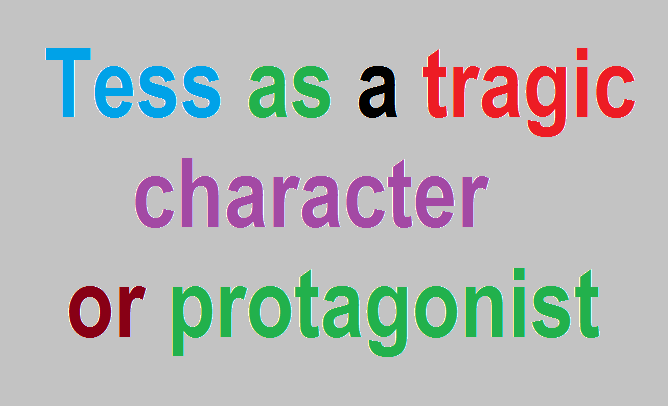The classical concept about the reason of the fall and suffering in the life of a tragic character is that he or she falls victim of his, her Hamartia or tragic flaw which means error of judgment. This Aristotelian theory of tragic flaw is introduced to cause the tragic end in life of heroic character.
Tomas Hardy as a simple country girl, Tess as his heroine of Hardy’s novel “Tess of the D’Urbervilles. Hardy has given hi heroine a new dimension. Here Tess is not alone responsible for her fatal catastrophe, some other factors also liable to bring her downfall namely the economic hardship of her family, socio-economic system of the society, Alec’s seduction, Angel’s conventional and blind concept of purity.

The tragedy of Tess begins with her contact with D’Urberville family where she goes to work. From the very beginning Tess is unwilling to go to D’Urberville family and, unlike her mother. She has no illusion about marrying one of the D’Urbervilles. But finally she goes there being poverty of her family and at that place she is seduced by Alec.
During the time of the actual seduction, she is physically and mentally exhausted after long days labour. She does not understand what is happening with her. The tragedy of Tess runs in motion by the consequence of the economic distress of her peasant family.
Though Tess had no part of seduction, she begings to think that she herself is responsible. Her sense of guilt haunt her and she undergoes a period of suffering and isolation. She feels here mother:
“Why didn’t you tell there was danger in men Folk?”
Then she begins a fresh start a life and takes a job in a diary farm. Here she further meets Angel clare who proposes here and wishes to marry her. At first sight or time she refuses to proposal of Angel Clare. But at one point both decide to marry. Before their marriage Tess writes a letter to Angle informing him about here past life. But some somehow he does not get the latter and he deserts her.
Now her hope crumbles. Her falling in love with angel is as inevitable as fate. Yet she always feels the need to tell him about her past. A girl of impure heart would hide the whole fact but Tess can not do. So as it is against her nature. Tess discloses everything to Angel. But Angel rejects her and her last hope of happiness is gone. Yes she accepts her fate.
Her final surrender to Alec is caused but the extreme emotional and economical pressure. It is Clear when we find that after Angel’s return She stabs Alec and run after Angel. Thus in the whole novel there is sense that Tess’ tragedy is happened by the cruel and unsympathetic society.
Tess becomes Alec’s mistress. Angel returns from Brazil, reprinting his harshness but finds her living with Alec. Tess kills Alec in desperation, she is arrested and hanged. Hardy writes of three dairymaid that they were “Simple and Innocent girls” and “had deserved better at the hand of fate”. The final comment of this novel is
“Justice was done and the president of the immortal had ended his sports with Tess”.
Hardy Jude The Obscure
Hardy’s “Jude of the Obscure” aroused even more controversy. His last situation or tragedy like Tess. When Jude dies and his last words are
“Where is light given to him that is in misery, and life unto the bitter in soul?”
Above all we can say that Tess is not responsible for her tragedy. It is her social and economic position, nature and fate combine to bring her downfall. However all through the novel, there is a feeling that she more sinned against than sinning. Her tragedy arouses pity and fear in the mind of reader.
Students, for your better understanding about the tragic fate of Tess, you may watch the following video where Dr Sophie Gilmartin considers Tess of the D’Urbervilles’ fate, asking whether it is a case of bad luck, inevitability, gender and class, or the sins of the father being revisited on the daughter.
Read More Literary Writings:
To His Coy Mistress Analysis And Summary By Andrew Marvell
Somebody Once Told Me The World Was Macaroni Lyrics
The Love Song of J. Alfred Prufrock represents conflict of modern man
Robert Browning as a writer of dramatic monologue
Tennyson as a representative poet of his age or Victorian Period


